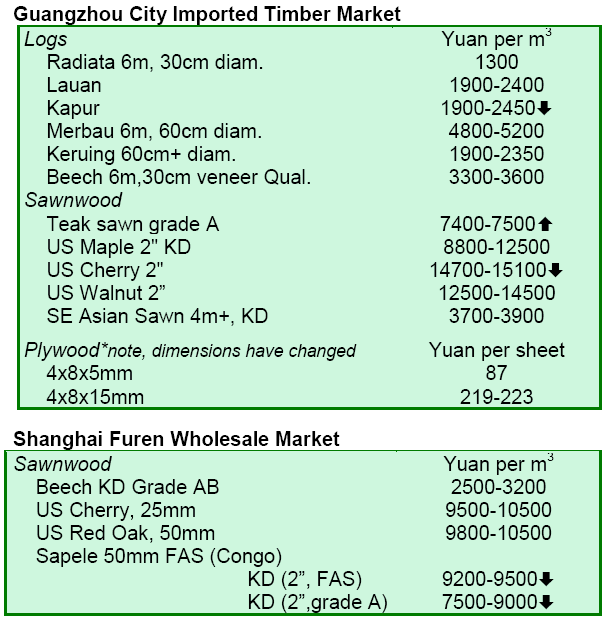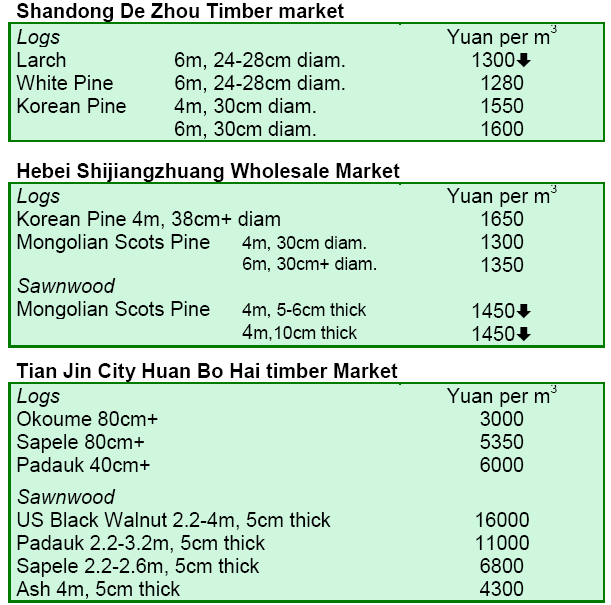US Dollar Exchange Rates of 13th June. 2008
China Yuan 6.8544
Report from China
¡¡
Initial benefits of tax policy observed
The Ministry of Finance and the State Taxation
Administration jointly issued The Notice on Collection
and Refund of Value-added Tax on Products Made of
Timber Residues and Inferior Fuelwood in 2006. Under
the notice, taxpayers who produce timber products from
three kinds of residues and inferior fuelwood could benefit
from a value-added tax preferential policy as of 1 January
2006 to 31 December 2008. The policy will expire at the
end of 2008.
A recent investigative report from the China Forest
Products Industry Association indicated that China¡¯s
wood-based panel, furniture, flooring and related machine
and electric manufacturing industries have developed
steadily since the implementation of the value-added tax
preferential policy. Wood-based panel enterprises have
benefited from this policy and upstream and downstream
enterprises have grown strongly. According to statistics,
the use of wood-based panels made of timber residues and
inferior fuelwood annually can reduce logging by 45
million units of forests. More than 6,000 enterprises in the
wood-based panel industry have asked for continued
eligibility to participate in the value-added tax preferential
policy.
Timber residues include logging residues such as
branches, tips, barks, leaves, roots, canes and shrubs,
bucking ends and residues during timber processing such
as slab, wood and bamboo ends, sawndust, defect veneer,
wood core, shavings and wood blocks. Inferior fuelwood
includes secondary processed logs (whose quality is lower
than the lowest grade of softwood and hardwood logs but
has the value to be processed), small diameter timber such
as small log strips, pine pole, wood pole and short logs
(lengths less than 2 meters or diameter less than 8 cm).
IFC and Morgan Stanley invests in flooring manufacturing
The World Bank Group's International Finance
Corporation (IFC) and Morgan Stanley have jointly
invested USD100 million in Nature, one of the largest
flooring manufacturers in China, to help the company
develop sustainable wood sourcing and promote
sustainable development of the flooring industry. IFC is
providing Nature with long-term financing and offering
strategic views to help China's wood companies grow in a
sustainable way.
The USD20 million in equity investment and USD30
million of long-term loans will help Nature implement its
growth strategy over the next three years. The financing
will enable the company to develop plantation forests in
the Jiangxi Province and establish a steady supply of
certified wood. These strategic moves will help position
the company as a leading player in the sector and bring
economic benefits to local communities.
Nature plans to increase the amount of certified wood it
uses and has committed to sourcing targets that will help
eliminate unknown sources of wood from its operations by
the end of 2009. Its target is to use 100% verified supply
of legal wood by the end of 2011.The China Forest Trade
Network, the national body of the World Wildlife Fund's
Global Forest and Trade Network, will regularly assess the
company's progress on these targets.
Log imports through Manzhouli Port fall 32%
Log imports through Manzhouli Port fell 32% during
January to May 2008, mainly as a result of the rise in
Russia¡¯s export tariff on logs. Russia hiked its log export
tariffs from 6.5% to 20% in July 2007 for the first time
and to 25% on 1 April 2008.
The major log species imported into Manzhouli Port are
Korean pine and Scots pine, which together account for
80% of log imports through the port. Larch log imports
make up the remaining 20%. Import enterprises in the
Inner Mongolia Autonomous Region were the primary
source of logs with log imports from Russia during
January to May amounting to 3.63 million m³, making up
96% of log imports through Manzhouli Port. The rest (4%)
were imported by enterprises in Heilongjiang and
Shandong Provinces.
Value of sawnwood imports jump 58% through Suifenhe Port
During January to May 2008, sawnwood imports through
Suifenhe Port rose dramatically and reached valued at
USD693.47 million, a year-on-year increase of 59% and
58% respectively. The rise was seen mainly because
Russia cancelled export tariffs on sawnwood. As of 14
June 2007, the Russian government declared zero export
tariffs on birch and poplar sawnwood with a thickness
more than 6 millimeters. The Russian government also
declared zero export tariff on softwood sawnwood.


¡¡
|